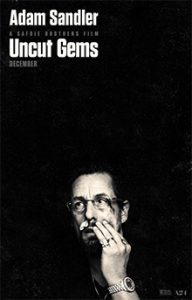 It’s been a couple of years since our interest was so piqued by a film that we wanted to review it for our Gambling in the Movies series. But this one was just too fascinating to pass up. The lab convened remotely during the COVID-19 shutdown to watch the film via Netflix Party and discuss over Slack. The film stars comedic mainstay Adam Sandler in a very serious role (not entirely uncommon; see Punch Drunk Love [2002], Reign Over Me[2007]), Broadway powerhouse Idina Menzel (Frozen, 2013), and Celtics stalwart Kevin Garnett (as himself). With a cast this varied, we had no idea whether we were in for a gripping, gritty masterpiece, or a noisy, patchwork affair. As it turns out, “Uncut Gems” (2018) is both of those things. But did it do a good job portraying gambling, gamblers, and addiction?
It’s been a couple of years since our interest was so piqued by a film that we wanted to review it for our Gambling in the Movies series. But this one was just too fascinating to pass up. The lab convened remotely during the COVID-19 shutdown to watch the film via Netflix Party and discuss over Slack. The film stars comedic mainstay Adam Sandler in a very serious role (not entirely uncommon; see Punch Drunk Love [2002], Reign Over Me[2007]), Broadway powerhouse Idina Menzel (Frozen, 2013), and Celtics stalwart Kevin Garnett (as himself). With a cast this varied, we had no idea whether we were in for a gripping, gritty masterpiece, or a noisy, patchwork affair. As it turns out, “Uncut Gems” (2018) is both of those things. But did it do a good job portraying gambling, gamblers, and addiction?
Uncut Gems follows the unraveling of Howard (Howie) Ratner (played by Sandler), a Jeweller in New York’s Diamond District, who at the start of the film finds himself in the grips of a gambling problem. Howie owes a lot of money to a lot of people. The film does not dwell on Howie’s back-story, but the viewer can put together the pieces: 1) Howie is extremely resourceful in obtaining funds to try to solve his debt problems with further gambling (we call this ‘loss-chasing’), 2) he shows some erroneous beliefs, for example that he has a unique understanding of the ways basketball referees decide games (these beliefs generally fall under the catchall term ‘cognitive distortions’), and 3) he gambles compulsively whenever he comes into some amount of money or something that can be pawned.
These actions have extreme consequences for Howie’s health, his workplace, and his family relationships. He endures an extreme degree of mental stress, is beaten, and is at one point stuffed naked into the trunk of his car. Howie’s business has fallen into disrepair as a result of constantly borrowing against his assets and laundering paperwork for fake Rolex watches. His gambling behaviour is rubbing off on his eldest son, a development that concerns his wife (Menzel). CGR agreed this was a ground-breaking portrayal of familial transmission of gambling behaviour on the big screen. Like “The Gambler” (1866; 1974; 2014), our protagonist borrows large sums of money from members of his family under worrying circumstances. In Gems, this behaviour is more shocking when it is revealed that one of his loan-sharks is also his brother-in-law. The most palpable outcome of all this is the revelation that, even when Howie wins (and he always seems to win his bets in this film), he still ends up losing something of greater value.
“I guess the real gem was the friends we made along the way.” -Sophie@CGR
Going into this film, we didn’t have much indication of what to expect. We were relieved to find Sandler’s performance – though comedic at times – appropriate for the more serious reality of the subject matter. The soundtrack was a moody, synth-heavy affair that would make John Carpenter blush. While we generally liked the music itself, we felt that it did little to situate the film in its setting. In many ways, Uncut Gems is an essentially ‘New York’ movie: it’s got jewellers, loan-sharks, heavy Manhattan accents, celebrities, night-life, drugs and money. Yet most of the film takes place in small, drab rooms with little connection to the music or editing.
Tension in the film ratchets up early, and stays high until the climax in the last 10 minutes of the film. This made for a relatively anxious watching experience, with most of us finding the relentless shouting and argument more than a bit unpleasant. It is difficult to connect with the lead characters, owing to the lack of development and redemption in individual storylines throughout the film. This movie is a wild ride, but it’s definitely not for everyone.
“Uncomfortable… but weirdly compelling.” -Luke@CGR
In all, Uncut Gems did a good job capturing some aspects of gambling, including the balance of desperation and ingenuity that characterize some gamblers’ search for funds, as well as kids’ learning of gambling behaviours from their parents. Sandler’s portrayal of problem gambling is compelling, if not a bit over-the-top compared to Philip Seymour Hoffman’s performance in Owning Mahowny (2003). The several brilliant elements of this film trip over some strange editing, a lack of character development, and the frequent use of shouting in place of real tension. In the end, we gave Uncut Gems a 6/10.